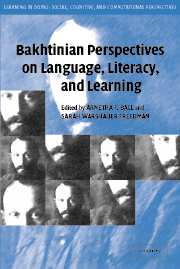Book contents
- Frontmatter
- Contents
- List of Contributors
- Acknowledgments
- PART I IDEOLOGIES IN DIALOGUE: THEORETICAL CONSIDERATIONS
- PART II VOICED, DOUBLE VOICED, AND MULTIVOICED DISCOURSES IN OUR SCHOOLS
- PART III HETEROGLOSSIA IN A CHANGING WORLD
- 9 New Teachers for New Times: The Dialogical Principle in Teaching and Learning Electronically
- 10 Is Contradiction Contrary?
- 11 A Bakhtinian Perspective on Learning to Read and Write Late in Life
- 12 New Times and New Literacies: Themes for a Changing World
- Voices in Dialogue – Hybridity as Literacy, Literacy as Hybridity: Dialogic Responses to a Heteroglossic World
- PART IV A CLOSING THOUGHT ON BAKHTINIAN PERSPECTIVES
- Author Index
- Subject Index
- Titles in the series
- References
10 - Is Contradiction Contrary?
Published online by Cambridge University Press: 24 May 2010
- Frontmatter
- Contents
- List of Contributors
- Acknowledgments
- PART I IDEOLOGIES IN DIALOGUE: THEORETICAL CONSIDERATIONS
- PART II VOICED, DOUBLE VOICED, AND MULTIVOICED DISCOURSES IN OUR SCHOOLS
- PART III HETEROGLOSSIA IN A CHANGING WORLD
- 9 New Teachers for New Times: The Dialogical Principle in Teaching and Learning Electronically
- 10 Is Contradiction Contrary?
- 11 A Bakhtinian Perspective on Learning to Read and Write Late in Life
- 12 New Times and New Literacies: Themes for a Changing World
- Voices in Dialogue – Hybridity as Literacy, Literacy as Hybridity: Dialogic Responses to a Heteroglossic World
- PART IV A CLOSING THOUGHT ON BAKHTINIAN PERSPECTIVES
- Author Index
- Subject Index
- Titles in the series
- References
Summary
… it's apparent … that the theories (people) employ change, flexibly and of necessity, from moment to moment in conversation, (and) that the notion of limiting conversation to a rigid rule of theoretical constancy is an absurd denial of what conversation is.
– (Gopnik, 2000, p. 96)On all its various routes toward the object, in all its directions, the word encounters an alien word and cannot help encountering it in a living, tension-filled interaction.
– (Bakhtin, 1934–35/1981, p. 279)When it comes to beliefs, attitudes, and values, as humans we may all be defined as much by contradictions as by consistencies. Everyday experience is enough to confirm this observation and, in fact, to give it the status of a truism. How it plays out for English teachers as they discuss their students' engagement with and achievement in literacy is the focus of this chapter. This chapter is about a group of secondary English teachers at the cutting edge of classroom practice, and about their holding of sometimes contradictory theories about engagement and achievement that get played out in their classrooms as part of writing and literature instruction. Rather than view such contradiction as problematic, I see it as ordinary and necessary in the dialogue forged of everyday classroom experience. Similar to essayist Adam Gopnik, cited at the opening of this chapter, I argue that teachers' shifting theories reveal the multiple and sometimes conflicting realities of their dialogic existence in the world of school or, put another way, their shifting identities as they relate to one another, to students inside the classroom, and to outside others, such as policy makers, who influence classroom life.
- Type
- Chapter
- Information
- Bakhtinian Perspectives on Language, Literacy, and Learning , pp. 232 - 251Publisher: Cambridge University PressPrint publication year: 2004
References
- 4
- Cited by

